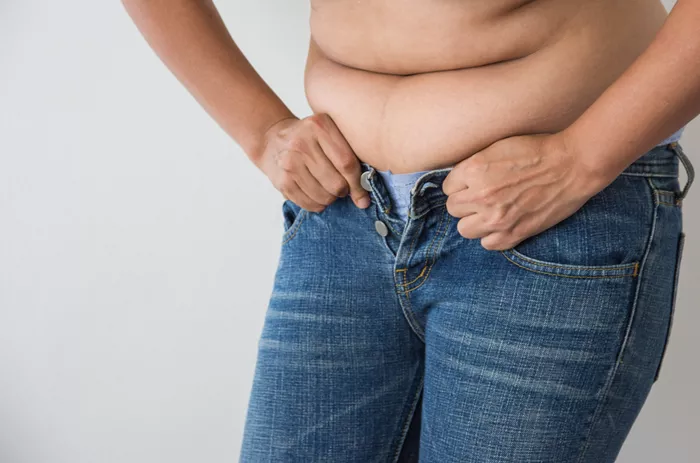Menopause is a natural stage in a woman’s life that marks the end of her menstrual cycles and fertility. However, it is often accompanied by various physical and emotional changes, one of which is weight gain. Many women experience difficulty in maintaining their weight during menopause, which can be linked to hormonal fluctuations. Estrogen, one of the key hormones involved in this phase, plays a significant role in this process.
But does estrogen help with menopause weight gain? In this article, we will explore how estrogen impacts weight and whether it can provide relief for women struggling with weight gain during menopause.
The Connection Between Estrogen and Menopause Weight Gain
During menopause, estrogen levels naturally decrease as women move through their midlife years. This drop in estrogen can lead to several changes in the body, including an increase in body fat, especially around the abdomen. Estrogen helps regulate fat distribution, and as its levels drop, fat tends to accumulate more easily in the abdominal area. This shift is one of the main reasons women may notice weight gain during menopause.
While the decline in estrogen is a major factor, other hormonal imbalances, lifestyle changes, and aging also contribute to weight gain. However, understanding estrogen’s role in menopause can help us determine if it can aid in weight management during this transition.
Can Estrogen Help with Weight Gain During Menopause?
Estrogen itself does not directly prevent or reverse menopause-related weight gain. However, research has shown that hormone replacement therapy (HRT), which includes estrogen, may help some women manage weight during menopause. Estrogen replacement can address some of the symptoms associated with menopause, such as hot flashes, night sweats, and vaginal dryness, which may also impact a woman’s ability to maintain a healthy weight.
One of the reasons estrogen may help with weight gain is its effect on metabolism. Estrogen plays a role in regulating metabolic rate and fat storage. With lower estrogen levels, the body’s metabolism may slow down, making it easier to gain weight and harder to lose it. By replenishing estrogen through HRT, some women may experience an improvement in their metabolism, which can help prevent further weight gain.
Additionally, estrogen can influence the way the body processes insulin. Insulin is a hormone that helps the body convert food into energy. When estrogen levels are low, insulin resistance may increase, leading to weight gain. By restoring estrogen levels with HRT, insulin sensitivity may improve, potentially helping women maintain a healthier weight.
Estrogen’s Role in Fat Distribution
Estrogen also has a significant effect on how fat is distributed throughout the body. During reproductive years, estrogen helps maintain a more even distribution of fat, with a focus on the hips, thighs, and breasts. However, as estrogen levels decline during menopause, fat tends to shift towards the abdominal area, leading to what is often referred to as “menopausal belly fat.”
The abdominal fat that accumulates during menopause is particularly concerning because it is linked to an increased risk of heart disease, type 2 diabetes, and other health issues. While estrogen therapy may help in reducing the accumulation of abdominal fat, it is not a guarantee. In some cases, lifestyle changes such as a balanced diet, regular exercise, and stress management may play a more significant role in managing weight and fat distribution.
Other Factors Affecting Menopause Weight Gain
While estrogen plays a role in menopause weight gain, it is important to note that other factors also contribute to the changes women experience during this time. For instance, decreased physical activity, changes in sleep patterns, and age-related muscle loss can all impact metabolism and body weight.
Physical Activity: As women age, they may become less active, which can contribute to weight gain. Regular exercise, including strength training and aerobic activities, is essential for maintaining a healthy weight during menopause.
Muscle Loss: With age, muscle mass naturally decreases, and this can slow down the metabolism. A slower metabolism can make it harder to burn calories and maintain a healthy weight.
Dietary Changes: Many women experience changes in their eating habits during menopause, sometimes due to stress or emotional changes. Poor dietary choices can lead to weight gain.
Sleep Issues: Menopause often brings sleep disturbances, such as insomnia or poor sleep quality, which can lead to weight gain. Lack of sleep can disrupt hormones that regulate hunger and appetite, causing increased cravings for unhealthy foods.
Conclusion
In summary, while estrogen may play a role in regulating metabolism and fat distribution, it is not a direct solution to menopause-related weight gain. Hormone replacement therapy, which includes estrogen,can be beneficial for some women in managing symptoms such as hot flashes and night sweats, which may indirectly help with weight control. However, the most effective approach to managing weight during menopause involves a combination of estrogen therapy (if prescribed by a healthcare provider), a balanced diet, regular exercise, and a focus on overall well-being.
It is crucial to consult a doctor before considering hormone replacement therapy or making significant lifestyle changes to address menopause-related weight gain. Every woman’s experience with menopause is different, and a tailored approach is often the best way to manage weight and other symptoms during this phase of life.
Related topics:
- What To Take For Menopause Weight Gain?
- What Supplements Help With Menopause Weight Gain?
- Best Diet for Perimenopause Weight Gain


